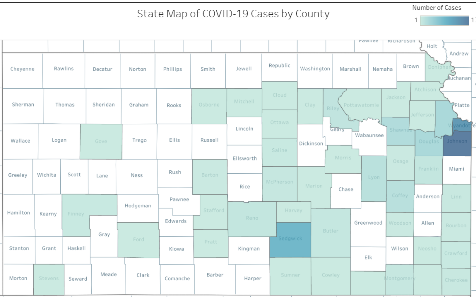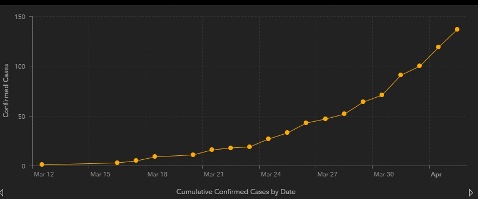

Wyandotte County reports one more death, and total of 139 cases
Kansas reported five more deaths from COVID-19 on Friday, bringing the state’s total to 17, according to reports from the Kansas Department of Health and Environment.
Positive cases rose by 68 statewide on Friday to a total of 620, according to Dr. Lee Norman, Kansas secretary of health, and the rate is still on the rise.
One of the new COVID-19 deaths was from Wyandotte County, according to the Unified Government’s COVID-19 website. Wyandotte County now has a total of 6 COVID-19 related deaths, with 139 positive cases and 40 persons hospitalized from COVID-19 at 5:15 p.m. April 3, according to the UG’s COVID-19 website.
Johnson County reported a total of 7 deaths as of April 3, an increase of three deaths since April 2, according to the Johnson County Health Department COVID-19 website. Johnson County went from 161 positive cases on April 2 to 172 cases on April 3.
Kansas added 138 new positive cases of COVID-19 over the past two days, Dr. Norman said.
Dr. Norman said there have been clusters of cases in long-term residential centers in Johnson, Wyandotte and Coffey counties, where caregivers or residents have contracted the disease.
Some recent online mobility reports from various sources have shown that Kansans have traveled around 35 percent less than before the stay-home order went into effect.
Dr. Norman said the state would reach the peak of the COVID-19 pandemic quicker once it gets to 45 percent and 55 percent. The community mobility reports, such as one from Google, are not sponsored or funded by the state.
“We cannot let up on social distancing and stay-at-home,” he said.
Ages 20 to 44 account for 29 percent of the COVID-19 positive cases in Kansas, and Dr. Norman said many persons in that group could be asymptomatic, not feeling as ill as others, so they may be going about their normal activities even though there are stay-home orders. They also may be less likely to follow rules and don’t feel as vulnerable.
Some in the older age groups may understand they’re at risk, while some of the younger persons may not feel they’re at risk.
He said everyone needs to stay home, as they could be carrying the coronavirus and not know it.
Gov. Laura Kelly said a lot of 24-year-olds have parents and grandparents, and if they don’t stay home for themselves they should do it for their parents and grandparents.
Dr. Norman said they are working with local health departments to increase the COVID-19 testing in communities, which will help them assess how widespread it is in communities.
Dr. Norman also said the state KDHE is managing the medical cases of persons in the Lansing Correctional Facility who have come into contact with persons who are positive for COVID-19. The local communities’ health departments are managing community contacts of the workers who were positive, he said.
At 11 p.m. Thursday night, Kansas received its final allocation of supplies and equipment from the federal stockpile, Gov. Kelly said. During the weekend, the state will be doing inventory and sending the supplies to counties, she said. Kansas will receive 90 percent of its allocation, she said, and will not get the other 10 percent, which will be sent to somewhere else that is in need.
The state has put in several other requests since mid-March to the Federal Emergency Management Agency, and has yet to receive any of those shipments, she said.
She said the state will clear out its inventory by next Tuesday, sending supplies to counties, and will need to get restocked. Kansas has put in some orders from private companies, but has been experiencing shipping delays, she said.
April 4 will be four weeks since the first COVID-19 case was reported in Kansas, Gov. Kelly said.
“It’s a bit jaw-dropping to reflect on how much of our world has changed in such a short period of time,” Gov. Kelly said.
She said she must think about the economic challenges waiting for Kansas once they get to the other side of the public health emergency. That includes jobs, small businesses and economic recovery.
On Friday morning, Gov. Kelly signed a new bipartisan 10-year transportation plan for Kansas, Senate Bill 173.
She said it offers a visionary approach to Kansas infrastructure, so that the state has the flexibility to address immediate needs and secure more opportunities for the future.
“Investing in Kansas’ infrastructure means putting people to work,” she said, as well as fixing roads and bridges and safer transportation for children.
All remaining T-Works projects would be let by July 1, 2023, she said. KDOT would establish metrics making sure highway preservation needs are fully funded before adding to the current highway system, she said. Emerging needs would be met with new projects selected every two years, she said.
According to the legislation, each Kansas county would receive at least $8 million in transportation improvements, she said.
Broadband and new technology improvements are included, she said.
Gov. Kelly also mentioned the paycheck protection program, a new $350 billion federal program passed by Congress last week, that formally launched Friday through the Small Business Administration. It offers small businesses low-interest loans, and the loans would be forgiven if all employees are kept on the payroll for eight weeks, and the money is used for payroll, rent, mortgage interest or utilities.
This program will help Kansas small businesses to keep their workers on the payroll and will be available through June, she said.
Lenders are bracing for an onslaught of applications, she said. Kansas banks only received final rules and guidance for the program from the federal government last night, and the governor urged small businesses to apply and to be patient with local lenders as they work through the regulations as quickly as possible.
Gov. Kelly also said the state launched a new jobs website through the Kansas Department of Commerce, connecting job seekers with businesses, including some essential positions. The website, kansasworks.com/coronavirus, allows businesses to post positions that are open, at no cost to the employer or job seeker.
Gov. Kelly’s news conference is online at https://www.facebook.com/GovLauraKelly/.
The Kansas COVID-19 website is at
https://govstatus.egov.com/coronavirus.
The UG’s COVID-19 response website is at
www.wycokck.org/COVID-19.
COVID-19 information from the CDC is at https://www.cdc.gov/coronavirus/2019-nCoV/index.html.
